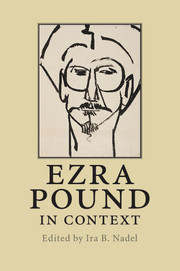Book contents
- Frontmatter
- Contents
- Notes on contributors
- Acknowledgements
- Chronology
- List of abbreviations and note on references to The Cantos
- Introduction
- Part I Biography and works
- 1 Prose criticism
- 2 Poetics
- 3 Translation
- 4 Romance languages
- 5 Letters
- 6 Editor, anthologist
- 7 Education
- 8 Journalism
- 9 Politics
- 10 Economics
- 11 Radio broadcasts
- 12 Law
- 13 Textual criticism
- 14 Archives
- 15 The Lives of Pound
- Part II Historical and cultural context
- Part III Critical reception
- Further reading
- Index
9 - Politics
Published online by Cambridge University Press: 05 July 2014
- Frontmatter
- Contents
- Notes on contributors
- Acknowledgements
- Chronology
- List of abbreviations and note on references to The Cantos
- Introduction
- Part I Biography and works
- 1 Prose criticism
- 2 Poetics
- 3 Translation
- 4 Romance languages
- 5 Letters
- 6 Editor, anthologist
- 7 Education
- 8 Journalism
- 9 Politics
- 10 Economics
- 11 Radio broadcasts
- 12 Law
- 13 Textual criticism
- 14 Archives
- 15 The Lives of Pound
- Part II Historical and cultural context
- Part III Critical reception
- Further reading
- Index
Summary
Ezra Pound's politics are a unique alloy of Jeffersonian populism, Chinese Confucianism, and his heterodox interpretation of fascism. Pound saw himself as a “left-wing fascist” because he was an economic determinist, but as a firm believer in the Jewish–Bolshevik conspiracy, Pound was also to the right of most Italian fascists, closer to their Nazi cousins. During his incarceration at St. Elizabeths, 1945–58, Pound reappeared as an American-style right-wing extremist. Convinced that the Supreme Court justices were communists, Pound worked through surrogates to attempt to prevent the integration of American schools and roll back the liberal judicial activism that threatened his strict constructionist and thoroughly Jeffersonian view of the US Constitution. Pound believed that a corrupt economic system meant a corrupt politics; inevitably, war, famines, and general devastation must follow; therefore economic change must precede political change.
Pound's politics evolved because his imagination was syncretic; he found meeting points between poetical, political, and economic programs that others found completely incompatible. The ideogrammic method of heaping like things together that became Pound's main poetic tactic in The Cantos is syncretic. The Cantos “rhyme” ancient Greece with ancient China, John Adams with Chinese history, Mussolini with Confucius. He thought analogically: “Mencius has gone into [Confucian] detail as…Van Buren has gone into detail from a Jeffersonian basis” (SPR, 96). His distinctive “Volitionist” economics was a marriage of Social Credit thinking with the stamp scrip mechanism of Sylvio Gesell – never mind that neither Major Douglas nor Pound's Gesellite correspondents could see any point of agreement.
- Type
- Chapter
- Information
- Ezra Pound in Context , pp. 96 - 105Publisher: Cambridge University PressPrint publication year: 2010

